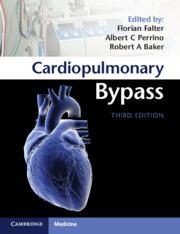Book contents
- Cardiopulmonary Bypass
- Cardiopulmonary Bypass
- Copyright page
- Contents
- Contributors
- Foreword
- Chapter 1 Human Factors and Teamwork in Cardiac Surgery
- Chapter 2 Equipment for Cardiopulmonary Bypass
- Chapter 3 Monitoring during Cardiopulmonary Bypass
- Chapter 4 Cardiopulmonary Bypass Circuit Setup and Safety Checks
- Chapter 5 Priming Solutions for Cardiopulmonary Bypass Circuits
- Chapter 6 Anticoagulation for Cardiopulmonary Bypass
- Chapter 7 Conduct of Cardiopulmonary Bypass
- Chapter 8 Minimal Invasive Extracorporeal Circulation
- Chapter 9 Considerations for Operations Involving Deep Hypothermic Circulatory Arrest
- Chapter 10 Metabolic Management during Cardiopulmonary Bypass
- Chapter 11 Myocardial Preservation during Cardiopulmonary Bypass
- Chapter 12 Weaning from Cardiopulmonary Bypass
- Chapter 13 Intraoperative Mechanical Circulatory Support and Other Uses of Cardiopulmonary Bypass
- Chapter 14 Mechanical Circulatory Support
- Chapter 15 Cardiopulmonary Bypass for Pediatric Cardiac Surgery
- Chapter 16 Coagulopathy and Hematological Disorders Associated with Cardiopulmonary Bypass
- Chapter 17 Inflammation and Organ Damage during Cardiopulmonary Bypass
- Chapter 18 Neuromonitoring and Cerebral Morbidity Associated with Cardiopulmonary Bypass
- Chapter 19 Renal Morbidity Associated with Cardiopulmonary Bypass
- Chapter 20 Common and Uncommon Disasters during Cardiopulmonary Bypass
- Index
- References
Chapter 11 - Myocardial Preservation during Cardiopulmonary Bypass
Published online by Cambridge University Press: 24 October 2022
- Cardiopulmonary Bypass
- Cardiopulmonary Bypass
- Copyright page
- Contents
- Contributors
- Foreword
- Chapter 1 Human Factors and Teamwork in Cardiac Surgery
- Chapter 2 Equipment for Cardiopulmonary Bypass
- Chapter 3 Monitoring during Cardiopulmonary Bypass
- Chapter 4 Cardiopulmonary Bypass Circuit Setup and Safety Checks
- Chapter 5 Priming Solutions for Cardiopulmonary Bypass Circuits
- Chapter 6 Anticoagulation for Cardiopulmonary Bypass
- Chapter 7 Conduct of Cardiopulmonary Bypass
- Chapter 8 Minimal Invasive Extracorporeal Circulation
- Chapter 9 Considerations for Operations Involving Deep Hypothermic Circulatory Arrest
- Chapter 10 Metabolic Management during Cardiopulmonary Bypass
- Chapter 11 Myocardial Preservation during Cardiopulmonary Bypass
- Chapter 12 Weaning from Cardiopulmonary Bypass
- Chapter 13 Intraoperative Mechanical Circulatory Support and Other Uses of Cardiopulmonary Bypass
- Chapter 14 Mechanical Circulatory Support
- Chapter 15 Cardiopulmonary Bypass for Pediatric Cardiac Surgery
- Chapter 16 Coagulopathy and Hematological Disorders Associated with Cardiopulmonary Bypass
- Chapter 17 Inflammation and Organ Damage during Cardiopulmonary Bypass
- Chapter 18 Neuromonitoring and Cerebral Morbidity Associated with Cardiopulmonary Bypass
- Chapter 19 Renal Morbidity Associated with Cardiopulmonary Bypass
- Chapter 20 Common and Uncommon Disasters during Cardiopulmonary Bypass
- Index
- References
Summary
Avoiding unnecessary myocardial damage has been at the forefront of cardiac surgery since its early days. The ability to arrest and immobilize the heart and revive it again without loss of function has facilitated more and more complex surgeries. Effective myocardial protection, particularly for the duration of aortic cross clamping, involves multimodal strategies consisting of temperature management, cardioplegic solutions delivered by various routes as well as non-cardioplegic techniques like ischemic preconditioning through intermittent cross-clamping or pharmacological protection.
Keywords
- Type
- Chapter
- Information
- Cardiopulmonary Bypass , pp. 102 - 111Publisher: Cambridge University PressPrint publication year: 2022

